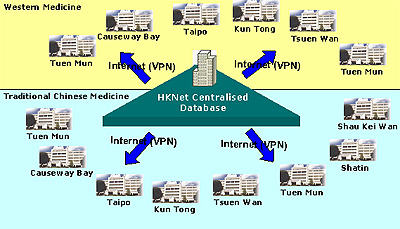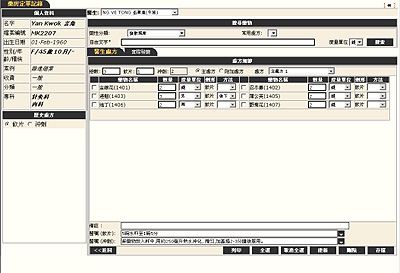 Since 1950, Hong Kong Federation of Trade Unions Workers’ Medical Clinics (FTU) have been delivering professional and affordable healthcare services to the general population of Hong Kong. On average, the organisation manages about 2,400 patient visits a day at her fourteen clinics geographically distributed across the territory.
Since 1950, Hong Kong Federation of Trade Unions Workers’ Medical Clinics (FTU) have been delivering professional and affordable healthcare services to the general population of Hong Kong. On average, the organisation manages about 2,400 patient visits a day at her fourteen clinics geographically distributed across the territory.
To lighten the healthcare costs of union members and senior citizens, FTU has offered various attractive subsidised schemes for members and their dependants seeking outpatient services. With FTU, her members have the wider choice of choosing time-honored efficacy of Traditional Chinese Medicine (TCM) or scientifically-based Western Medicine (WM) to relieve their ills and pains. FTU’s clinics are staffed with a team of qualified and proficient TCM practitioners and modern medicine physicians.
Although the multi-locations operation model brings forth to patients excellent primary healthcare services at door-step conveniences, it has also posed a series of management challenges due to the lack of connectivity and information integration amongst the clinics. Typical problems associated with a clinic group that warrants management concern were:
- duplicate patient identities
- disjoint medical records
- inconsistent data on patient’s benefits tracking
- lack of coordinated inventory management
- disparity in pricing regime
- inefficient resource utilization
- delays in consolidated management reporting
- difficulty in providing system maintenance support
Moreover, the differences in work practices of WM and TCM further contributed to the difficulty in ensuring consistency in patient service delivery.
Recognising the inadequacy of her standalone Clinic Management System, FTU decided to source for a solution that not just replaces her current system but also helps to harmonise the work processes for greater operational efficiency and patient safety.
In sourcing for an ideal solution, FTU set the following criteria:
- Create a Patient Master Index (PMI) that manages all patients registered at any FTU clinics whereby each patient is singularly identified through a unique patient identification number. Additional patient identification numbers such as HK ID, clinic-specific medical record number can also be maintained for historical tracking. The PMI holds demographic, billing profile and vital clinical alerts.

- Offer a clinical workstation that aids the physician to track and document consultation notes, findings and treatment plan in a multi-practice environment. The clinical workstation will support direct order entry of medication, investigations such as laboratory & radiological tests and procedures. These requests are instantly routed to relevant departments for processing.
- Enhance patient safety by embedding drug interactions, allergies, drug contradictions and maximum dosage checks into the order management function.
- Provide a cross-disciplinary, patient-focused view of clinical information in the form of a unified cumulative Electronic Medical Record (EMR). The EMR will support an automated document management workflow when paper-form medical notes co-exist together with electronic form for completeness of patient medical records. Access to stored clinical data is limited to authorised care providers.
- Administer the benefit entitlements of signed-up members and provide real-time usage tracking of these benefits by FTU’s members and their dependants.
- Support central procurement of pharmaceuticals, Chinese herbs and medicinal products to leverage on bulk purchases discounts. Effective inventory planning and monitoring are aided by online alerts and up-to-date inventory consumption tied to clinic workflow.
- Offer a flexible parameter-driven billing engine to handle FTU’s comprehensive discounts schemes and healthcare packages. The system will prevent disparity in services/items pricing amongst the clinics. Consolidated billing, patient accounts receivables and third party payers can be ably managed.
- Coordinate the patient encounter workflow (e.g. patient to pay at billing station before rendering of services or dispensing of drugs) to facilitate higher operational efficiency. From analysing collected statistics and online monitoring of various patient queues in different clinics, FTU management can maximise on the returns of resource utilisation by adjusting staff rostering and resources deployment.
- Aid the harmonisation of WM and TCM clinic practices into a common set of work processes and standardise as clinic operating procedures to raise the service levels of patient care delivery.
- Provide flexible multi-languages support as WM and TCM medication formularies and consultation proceedings are recorded in different preferred languages.

- Consolidate and report on clinics’ activities in real-time mode across geographical divide for management to make informed decisions.
- Ease maintenance by using a thin-client Web-based solution that can be administered centrally. The system must be a scalable solution to meet increasing demands of a healthy growing FTU.
The management of not-for-profit FTU, after rounds of conscientious evaluation and deliberation, selected Nova’s VESALIUS as the product of choice to achieve their aim of delivering personalised healthcare services at affordable fees and fuel their future expansion plans.
VESALIUS Clinic Management System was successfully piloted at Tuen Mun’s WM clinic in November 2004 and within two months, operations in all six WM clinics of FTU were fully supported by the new system.
The distinctiveness of this VESALIUS implementation lies in the Enterprise Application Service Provider (ASP) architectural model that was adopted. The application and database servers were securely located in a third party data center and clinic PCs were running the Clinic Management System off the application server via HTTP protocol over the world-wide-web. Other than the browser software, there was no software requirement for the PCs to operate VESALIUS. Support and maintenance of VESALIUS were remotely administered via Nova’s Issue Management Portal.
This successful implementation acts as further proof that VESALIUS is truly a robust and scalable web-based solution that can deliver high-end healthcare applications without compromising on security and performance.
Traditional Chinese Medicine
Building on the success of WM implementation in FTU, Nova developed and launched the TCM functionalities in October 2005.
Clinical modules were added to the core functions of VESALIUS Clinic Management System to support TCM specific services such as acupuncture, tui-na (body massage) and bone-setting physiotherapy. The Pharmacy module was further enhanced to handle herbal medicinal products, which can intrinsically switch from raw herbal material to concentrated herbal granules. As a typical Chinese medication can easily comprise of up to 20 herbal medicinal products, enhanced user-friendliness and intelligent data entry features were designed into the modules to facilitate greater acceptance of the system by first-time TCM users.
With its feature-rich functionalities and extensive commitment to R&D, VESALIUS has once again demonstrated the dexterity of a readily deployable product.
Comments are closed.

